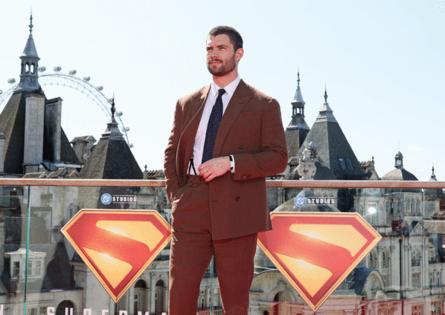Gearoid Reidy: Hollywood has lost the plot on telling stories
Published in Entertainment News
Up in the sky! Look! It’s a bird! It’s a plane! It’s... another summer of rehashes.
The peak period for the box office is rarely full of the most original ideas. But even so, this year leaps over the offenses of the past with a single bound. The three biggest movies Hollywood studios have pinned their hopes on in 2025 are the third new take on "Superman" in the last 20 years, the fourth iteration of the "Fantastic Four," and the sixth attempt to recapture the magic of 1993’s "Jurassic Park." The only U.S. film to top $1 billion this year is "Lilo & Stitch," another live-action remake tapping into Gen Z and millennial nostalgia. In 2024, there wasn’t a single original film that broke the U.S. box office top 15.
It’s further evidence that Western culture seems to have reached an impasse — wistful for our youth and unable to come up with any new ideas. The contrast was particularly stark here in Japan, the world’s third-largest cinema market. A week after "Superman" opened, I struggled to find a theater still showing it — with all available screens occupied by the smash "Demon Slayer" movie. In just 10 days, the animated hit grossed 12.9 billion yen ($87 million) and is on track to become Japan’s highest-earning film ever.
While it might be a sequel to the 2020 flick, "Demon Slayer" is a property less than a decade old. The action fantasy is based on a manga that began in 2016 and concluded just four years later. "Superman" tales have been continuously churned out for 86 years.
Instead of endless stories involving the same handful of superheroes, Japan’s entertainment industry is constantly creating fresh ideas. There are around 300 new anime series produced each year, most coming from the pages of manga — a low-cost way to test what works. And there are far more diverse genres on offer than just superheroes, from the volleyball manga "Haikyu!!," which debuted in 2012, to "Kingdom," a retelling of the Chinese warring states period that first appeared in 2006, both of which have recently been top-grossing films.
It’s not just Japan. In China, audiences boosted "Ne Zha 2" to the biggest-earning movie worldwide this year. It might be a sequel, but it’s one to a relatively recent property, with the first hitting in 2019. And a decade from now, while Hollywood will likely still be going back to the well for "Superman," "Spider-Man" and "Batman," I doubt we’ll be watching reboots of either.
I admit there’s a certain charm to seeing the same idea interpreted by different generations — to see how the kooky Tim Burton interpretation of "Batman" moves through to the more realistic, gritty takes of the mid-2000s. Reflecting the growth of online geek culture, today’s adaptations lean into comic-book references, and assume deep audience familiarity with origin stories and characters.
But particularly outside of the U.S., audiences are tiring of the same old story. Nonetheless, studios remain undaunted, with the next few years promising "Supergirl," two more "Avengers" flicks and the ninth live-action "Spider-Man" movie since 2002. There’s "Toy Story 5" and yet another "Lord of the Rings" prequel. The only thing that’s not a sequel might be Christopher Nolan’s "The Odyssey" — though does an adaptation of a nearly 3,000-year-old epic count? Our obsession with the familiar isn’t just limited to the silver screen — see how Oasis and Beyoncé’s tours are capturing the zeitgeist.
Algorithms may indeed be corrupting what we interact with, creating a feedback loop of surfacing things we already enjoy. But I don’t believe — as some have argued — that the love of nostalgia is a sickness, brought on by the infantilization of society, “extended adolescence,” or too much time spent online (for one thing, Asian societies are just as online, if not more so). And of course, Japan loves its familiar series, too — this year alone has seen the 28th "Detective Conan" movie about a sleuth trapped in the body of a schoolboy, and a series in the long-running military sci-fi "Gundam" property. The hit "Godzilla Minus One" shows that Japan also loves going back to the well. But these are balanced out by new ideas.
Hollywood’s inability to move forward seems more like a function of business, in particular the frenetic pace of studio consolidation. That continues with the recently approved merger of Paramount Global and Skydance Media; Marvel and DC, the creators of almost all mainstream American superhero properties, have both been subsumed into these studios.
The “creative destruction” that Western-style capitalism promises doesn’t seem to be inventing much besides shareholder value. Instead, it rewards a risk-adverse management approach that likes the predictable ticket. Ironically, the “production committee” approach to most Japanese animated movies, with multiple companies splitting the risks and revenues of original projects, might be bad for artists but seems good for creativity.
There’s nothing wrong with the familiar. While I’m not sold on the attempts to make "Fantastic Four" a hit, I’ll still be first in line for "The Batman Part II." But we can’t live on nostalgia alone. Give us some fresh stories.
———
This column reflects the personal views of the author and does not necessarily reflect the opinion of the editorial board or Bloomberg LP and its owners.
Gearoid Reidy is a Bloomberg Opinion columnist covering Japan and the Koreas. He previously led the breaking news team in North Asia, and was the Tokyo deputy bureau chief.
©2025 Bloomberg L.P. Visit bloomberg.com/opinion. Distributed by Tribune Content Agency, LLC.













Comments